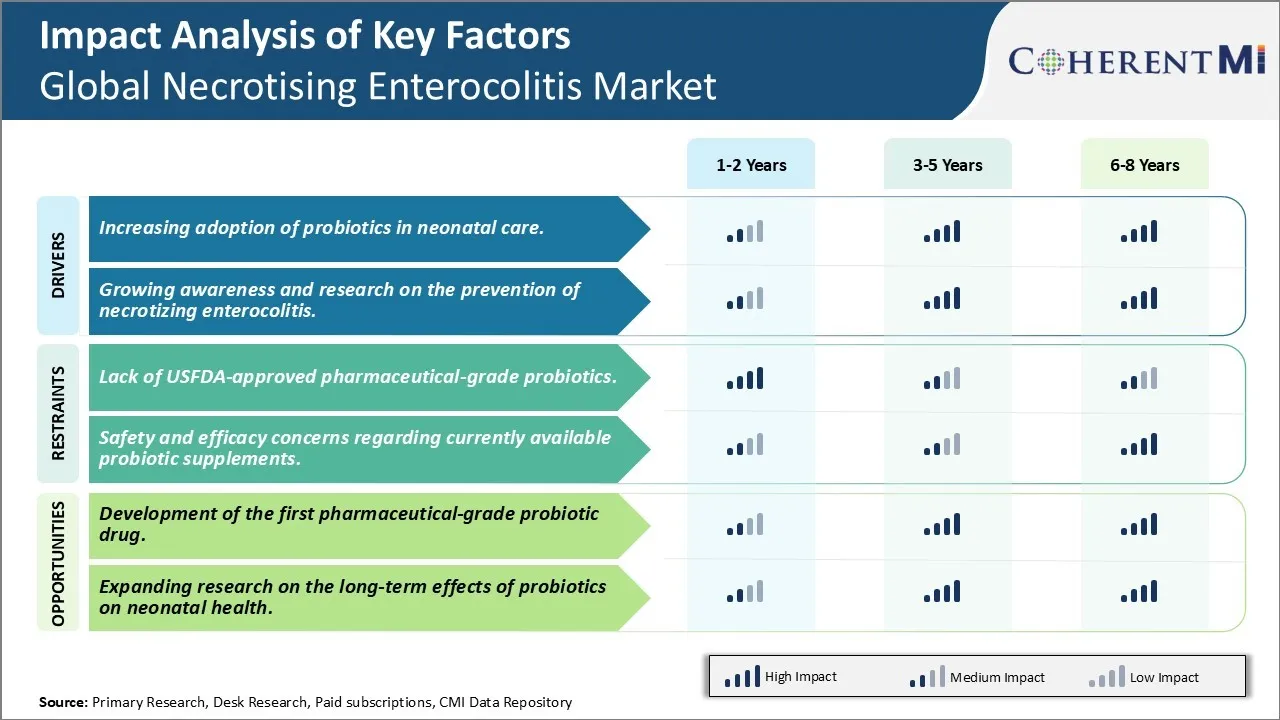Necrotising Enterocolitis Market Trends
Market Driver - Increasing adoption of probiotics in neonatal care
The use of probiotics in the neonatal intensive care units has gained significant momentum over the past few years. Several clinical studies have demonstrated the therapeutic potential of probiotics like Bifidobacterium and Lactobacillus in preventing necrotizing enterocolitis in preterm infants. The mainstreaming of probiotics into standard neonatal care protocols is a positive sign as it can help counter the dysbiosis of the gut microbiome often seen in premature babies. The immaturity of intestinal motility function and lack of protective microflora expose preterm infants to infections and inflammatory diseases like NEC. Probiotics supplementation aims to colonize the gut of newborns with beneficial microorganisms and maintain a balanced microbial community. This early gut colonization by probiotics creates a defensive barrier against pathogens and modulates the immune system of preemies. Several randomized controlled trials have proven the safety and efficacy of probiotics in reducing the risk and severity of NEC in neonates. With an increasing number of level 1 evidence to support their application, major neonatal associations now endorse the inclusion of probiotics containing Bifidobacterium and Lactobacillus strains in standard care protocols. This is spurring hospitals across regions to adopt probiotic-based formulations for newborns, especially those born before 37 weeks of gestation who are at highest risk of NEC. The continued research exploring new probiotic strains and combinations coupled with growing evidence of health benefits will further augment the use of probiotics in neonatal intensive care worldwide.
Growing awareness and research on the prevention of necrotizing enterocolitis
Necrotizing enterocolitis remains one of the most devastating gastrointestinal emergencies affecting premature infants. However, in the past decade there has been a significant rise in awareness about NEC within the neonatal care community as well as among expectant parents. Various advocacy groups are actively working with healthcare professionals, policymakers, and researchers to increase understanding of this disease. They focus on educating families about risk factors, early signs and optimizing care practices to boost outcomes. At the same time, governments and private donors are allocating higher funding for NEC related research. This is propelling scientific exploration into various preventive strategies from nutritional interventions to novel probiotic formulations. The growing body of literature analyzing the pathogenesis, risk factors, innovative diagnostic methods along with preventive approaches has expanded clinical knowledge. Neonatologists now have access to evidence-based management protocols that empower them to optimize enteral feeding routines, institute measures like limited oral feeding and selectively use prebiotics & probiotics for high-risk infants. Even long term follows up studies are providing deep insights on growth, development and quality of life for NEC survivors. This collective advancement in awareness, research support and dissemination of best practices among healthcare teams has started making meaningful impact. Though NEC remains a complex multi-factorial disease, focused efforts on prevention hold promise for gradual reduction in severity and mortality associated with this condition in future.

Market Challenge - Lack of USFDA-approved pharmaceutical-grade probiotics
One of the key challenges currently faced by the global necrotising enterocolitis market is the lack of USFDA-approved pharmaceutical-grade probiotics. Necrotising enterocolitis is a disease that mainly affects premature infants, and while probiotics have shown promise in clinical trials as a potential treatment or preventative measure, there are currently no probiotic agents that have received USFDA approval for treating or preventing NEC. Most probiotic products available today are classified as dietary supplements rather than drugs, and evidence of their safety and efficacy from clinical trials has often been inconsistent or limited. For a probiotic to be considered for wider medical use in NEC, larger and more robust clinical studies are needed to demonstrate clear benefits. Probiotic manufacturers also need to adhere to strict pharmaceutical manufacturing guidelines or "good manufacturing practices" in order to assure product quality and consistency required for USFDA approval. The lack of an approved probiotic hampers the ability of physicians to routinely recommend probiotic therapies and limits access for patients who could potentially benefit from them. Considerable additional research and regulatory progress is still needed in this area.
Market Opportunity- Development of the first pharmaceutical-grade probiotic drug
One major opportunity for the future growth of the global necrotising enterocolitis market is the development of the first ever pharmaceutical-grade probiotic that receives regulatory approval from the USFDA for treating or preventing NEC. Significant effort is currently underway by research institutes and probiotic companies to conduct large, high-quality clinical trials using defined probiotic strains produced under strict pharmaceutical standards. A probiotic formulation that demonstrates compelling clinical efficacy and safety data through such pivotal trials could potentially be the first drug to be approved by the USFDA for medical use in NEC. This would open up the possibility of physicians routinely prescribing probiotics as a standard treatment option. It would also enable the scale-up of manufacturing using GMP standards required for drug production. Achieving this major regulatory milestone could help consolidate the role of probiotics for NEC and pave the way for greater adoption, establishment of reimbursement policies and overall market potential. Given the ongoing research investments, a successful product approval may not be too far away.